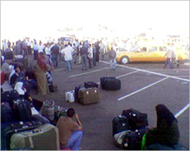Palestinians stranded at border crossing
With the world’s focus on the Palestinian elections, Palestinians stranded at the closed Rafah-Egypt border feel they have been forgotten.

One such victim of the Israeli measure is Yasmin and her groom who held their engagement celebration in a Cairo hotel.
For the Palestinian couple from Gaza it was supposed to be a momentous occasion that was months in the planning – the celebration of the beginning of a lifetime together.
But the ceremony was bittersweet, and the dance floor empty save for the bride and groom. The majority of their guests, after all, could not attend.
The Rafah Terminal, Gaza’s only route connecting the small strip of land and its 1.4 million people to the outside world, has been closed for nearly four weeks, since an explosion in a tunnel rocked the border crossing, killing five Israeli soldiers and wounding several others.
“We want to have the wedding in Gaza next year, but with the situation so unpredictable we do not know what is possible or not any more,” said the bride’s mother, Ibtisam Zimmo.
Stranded and cold
Approximately 3000 Palestinians are now waiting in Egypt to enter Gaza, stranded somewhere between Cairo and the coastal Egyptian city of al-Arish, unable to return to their homes in Palestine.
 |
|
Many stranded Palestinians will be |
Many have no contacts in Egypt, and most cannot afford to rent flats, let alone a hotel, for such a long period of time.
Several hundred Palestinians have taken to sleeping in the departure hall of the border crossing, with nothing but thin blankets to shield them from the Sinai desert’s freezing nights, and with the world’s attention focused elsewhere, little is being done about it.
“What can I say? Their situation is miserable,” says Samir Fuda, who runs a taxi service that shuttles people from Cairo to the border, and who himself has been out of business for more than a month now.
“Their money has run out, they are living day-to-day, and they have nowhere to sleep but the ground in these freezing temperatures,” he said.
Unable to vote
The border remains closed just as Palestinians are set to go to the polls to elect a new leader, a historic occasion amidst anomalous circumstances – Palestinian towns and cities remain occupied; checkpoints restricting or preventing free travel remain in place; and an illegal barrier continues to snake its way around West Bank towns unhindered.
Nearly 100,000 Palestinians from Gaza who live abroad but retain Palestinian ID cards are unable to return to vote due to the Rafah closure, according to Baha Bakri, Chief of Electoral Affairs of the Palestinian Central Election Commission.
An additional 200,000 West Bank Palestinians live abroad but cannot participate in the 9 January elections because no absentee voting is allowed.
The closure is equally problematic for Palestinians who wish to leave Gaza, with a disastrous impact on the right to health of Palestinians, according to the Palestinian Centre for Human Rights – patients badly in need of special medical treatment abroad have been unable to travel to receive it.
Hajj difficulties
The closure also coincides with the annual Muslim pilgrimage, or Hajj, to Makka in Saudi Arabia. About 800 Palestinian pilgrims were permitted to leave Gaza for the Hajj, but only after being forced to take a circuitous route through the Erez terminal at the Gaza Strip’s northern end, and along the green line to the Egyptian border.
An ordinarily two-hour trip by car now lasted 36 hours. Many were simply unable to endure it, falling ill and being forced to return home, according to witnesses.
 |
|
Thousands of Palestinians are |
At least 170 pilgrims from the Gaza Strip were prevented from travelling for the pilgrimage by Israeli authorities for “security reasons”, while dozens of others, including women and the elderly on a pre-approved list of pilgrims, were prevented from travelling due to “lack of necessary security coordination”.
Pilgrims in the south and central Gaza Strips faced the additional difficulty of passing through two checkpoints open for just a few hours at a time.
Israeli authorities say the closure will be extended, but insist they are not to blame.
“You should ask Hamas why they decided to execute this terror attack on Gaza‘s only border … causing the death of five soldiers, wounding five more,” said Eytan Arusi, spokesperson of the Israeli army.
“We did not close Rafah Border, the terrorist organisation Hamas and Sukur Fatah did that.”
Human rights groups consider the closure a form of collective punishment, however, and have called upon the international community and humanitarian organisations to intervene and to pressure the Israeli government to respect its obligations under the Fourth Geneva Convention.
So far, it seems their calls have fallen on deaf ears.